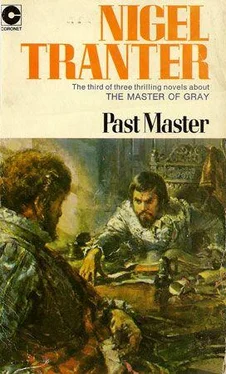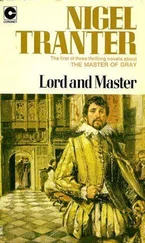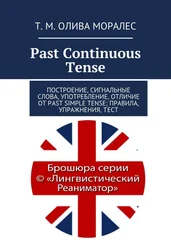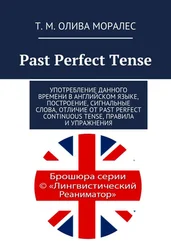Nigel Tranter - Past Master
Здесь есть возможность читать онлайн «Nigel Tranter - Past Master» весь текст электронной книги совершенно бесплатно (целиком полную версию без сокращений). В некоторых случаях можно слушать аудио, скачать через торрент в формате fb2 и присутствует краткое содержание. Жанр: Исторические приключения, на английском языке. Описание произведения, (предисловие) а так же отзывы посетителей доступны на портале библиотеки ЛибКат.
- Название:Past Master
- Автор:
- Жанр:
- Год:неизвестен
- ISBN:нет данных
- Рейтинг книги:5 / 5. Голосов: 1
-
Избранное:Добавить в избранное
- Отзывы:
-
Ваша оценка:
- 100
- 1
- 2
- 3
- 4
- 5
Past Master: краткое содержание, описание и аннотация
Предлагаем к чтению аннотацию, описание, краткое содержание или предисловие (зависит от того, что написал сам автор книги «Past Master»). Если вы не нашли необходимую информацию о книге — напишите в комментариях, мы постараемся отыскать её.
Past Master — читать онлайн бесплатно полную книгу (весь текст) целиком
Ниже представлен текст книги, разбитый по страницам. Система сохранения места последней прочитанной страницы, позволяет с удобством читать онлайн бесплатно книгу «Past Master», без необходимости каждый раз заново искать на чём Вы остановились. Поставьте закладку, и сможете в любой момент перейти на страницу, на которой закончили чтение.
Интервал:
Закладка:
James nodded, beaming now. 'Explicit,' he said. 'Full explicit. The auld woman had some glisks and glimmerings o' sense to her, after all! Aye – though she was a fell time about showing it. So – a's by with. England's mine. England's mine, Patrick – d'you hear? I'm rich, man – rich.'
Patrick bowed, unspeaking. He turned to Carey, who at last had risen from his knees. 'What of Cecil? And the Council? What of a proclamation?'
'I heard Cecil say to the Archbishop, sir, that the succession of King James would be put to the Council so soon as it could be assembled, in the morning. And the proclamation issued thereafter. That same Thursday morning.'
'So I've been King o' England for two days, no less – and didna ken it! Guidsakes – you wouldna think it possible! It's a right notable thought. I could indite a poem on it – aye, a poem. An opopee. An ode. I'll do that, Patrick – get me papers and pens. Here's occasion for notable rhyming.'
Carey stared, as Patrick bowed and murmured. 'Excellent, Your Grace. But… at this hour?'
'To be sure. What has the hour to do wi' the divine creation? The ardent excogitation? Paper, man. And have the bells to ring. The Kirk bells. A' the bells. To be rung until I command that they cease. Aye, and bonfires…'
'Sire – might I suggest a small delay? Until the English Council's word arrives. Sir Robert's tidings are joyful and welcome. But they are those only of a private subject, however excellent
It would be seemly would it not, to await the proper messengers of your Privy Council in England? And to inform your Scots Council before the public rejoicings.'
The King's face fell, and he darted a glance that was almost venomous at the speaker. He shrugged. 'Aye. Maybe,' he conceded shortly.
'Do you wish Her Grace to be informed, Sire?'
'Anne? Na, na – no hurry for that. She'll but haver and bicker on it. Soon enough for her, the morn.'
'Very well. I shall call a meeting of the Council for tomorrow?'
'Aye, do that. And see to Sir Robert here. Now – paper and pens, man…'
Chapter Twenty-five
The ranked cannon on Berwick's massive ramparts thundered out as never they had thundered before, it is safe to say, in all the Border fortress's long and turbulent history. Never had the cannoneers been so reckless of powder, and never before had those serried ranks of north-pointing English muzzles belched blank-shot. The echoes rolled back and forth across the winding Tweed and all the green plain of the Merse, tossed hither and thither by the distant encircling hills. To their accompaniment the great company approached the ancient grey-walled, red-roofed town by the glittering sea, which had for so long been the most bitterly grudged bone of contention between the two hostile nations.
It was as good as an army which flooded down from the Lamberton ridge to the north – although a very different army from the steel-clad host which had for so many months kept its silent vigil along the Border, and now was at last dispersing unrequired. This company, although fully a thousand strong, represented the very flower of Scotland. Not since King James the Fourth had led his resounding chivalry to disaster and extinction at Flodden Field exactly ninety years before, had so much brilliance, colour and circumstance come to the Border. Some would go on, across Tweed, and some would turn back, men and women both.
King James the Sixth and First was apparelled for the occasion. Seldom indeed can a man have sat a horse for a long journey happed in such sheer yardage of velvet, cloth-of-gold and satin-ribbon, not to mention the ostrich-plumes, gold chains and sundry decorations. If he did not outshine all his entourage, it was not for want of ornament. His Queen, some way behind, amongst her ladies, was much less adorned – and still in evil humour because her children had been left behind in Edinburgh in the care of the Earl of Mar.
The King rode between Sir Charles Percy, brother of the Earl of Northumberland, and Thomas Somerset, son of Lord Worcester, the English envoys who had brought north the official news of Queen Elizabeth's death, and the call to her throne from the Privy Council, three days after Sir Robert Carey's spectacular dash. Carey himself, promised a peerage and a pension, rode just behind with the Master of Gray and sundry English notables. The Duke of Lennox, who should have been close at his cousin's and monarch's side, was nowhere near – not even with the Queen's party where rode his Duchess, but far in the rear with Mary Gray, the Lady Marie and her children.
It looked as though even the weather of Scotland was glad to be getting rid of her peculiar sovereign, for the sun shone, the clouds sailed high and the air was balmy indeed for early northern April. This was as well, for the lesiurely progress southwards of this enormous cavalcade would have been a sorry business in bad weather. It was only the second day of the long journey, of course, which so far had been something in the nature of a triumphant procession, with cheering folk in every burgh and village, lairds hastening to provide stirrup-cups and lords greater hospitality; it remained to be seen whether the welcome of the southern kingdom, climatic and otherwise, would be as heartfelt as this northern farewell.
At least there was no doubt about Berwick's greetings and reception. The town had not had time to prepare the masques and spectacles seemly for the occasion – for James had wasted no time in shaking the dust of Scotland off his feet, this being but the 6th of April, he having set out only five days after the official news had arrived at Edinburgh; but, apart from the cannonade, Berwick's entire population showed its appreciation of its new situation, its release from the centuries-old condition of being almost a perpetually besieged city, by packing the narrow streets so tightly that it was almost impossible for the royal party to win through them. At the Scots Gate, the Governor and Marshal of Berwick, flanked by the Wardens of the Marches from both sides of the Border, awaited the monarch of them both – and who thereupon, with droll humour, dismissed them from their ancient offices, as no more necessary in his united domains. The Mayor then handed over the keys of the town – and what was still more welcome, a purse of gold – and commenced to read a lengthy peroration which the King presently interrupted, referring to the worthy as Provost and declaring that what he wanted to do was to inspect the cannon which had made such 'extraordinary exellent displosions'. Up on the ramparts which walled in the town, he started up the cannonade once more, himself gleefully discharging some of the pieces and commanding that there was to be no let up of the noise until all their powder was exhausted. Then, tiring of this, he set off through the crowded streets, to shouts of 'God save King James', his vast following making their difficult way through as best they might, down to the lower part of the town, near the river and harbour, called Ravensdowne, where at the Governor's House immense hospitality was prepared.
It was late in the afternoon before all was ready for the great moment, and the royal cavalcade somehow managed to reassemble, to convoy the royal traveller down to the bridge to cross Tweed into his new realm of England. The river here at its mouth is quarter of a mile in width, and the long, narrow and spidery bridge of timber, patched and mended from shatterings innumerable by storm, flood and war, represented a tenuous link indeed between the two kingdoms. The sight of it, hitherto hidden by the tall enclosing walls of the town, brought suddenly home to many just how significant was the occasion – brought indeed a lump into many a throat.
Many, the greater proportion of the company, were turning back here and there was a great taking of leave and saying of farewells. A large concourse was to be seen awaiting the monarch's arrival at The Spittall, on the other side of Tweed. A couple of hundred or so would accompany James all the way to London. Others would cross the river to but set foot on English soil and say their farewells there. Of this last group Mary Gray was to be one.
Читать дальшеИнтервал:
Закладка:
Похожие книги на «Past Master»
Представляем Вашему вниманию похожие книги на «Past Master» списком для выбора. Мы отобрали схожую по названию и смыслу литературу в надежде предоставить читателям больше вариантов отыскать новые, интересные, ещё непрочитанные произведения.
Обсуждение, отзывы о книге «Past Master» и просто собственные мнения читателей. Оставьте ваши комментарии, напишите, что Вы думаете о произведении, его смысле или главных героях. Укажите что конкретно понравилось, а что нет, и почему Вы так считаете.












